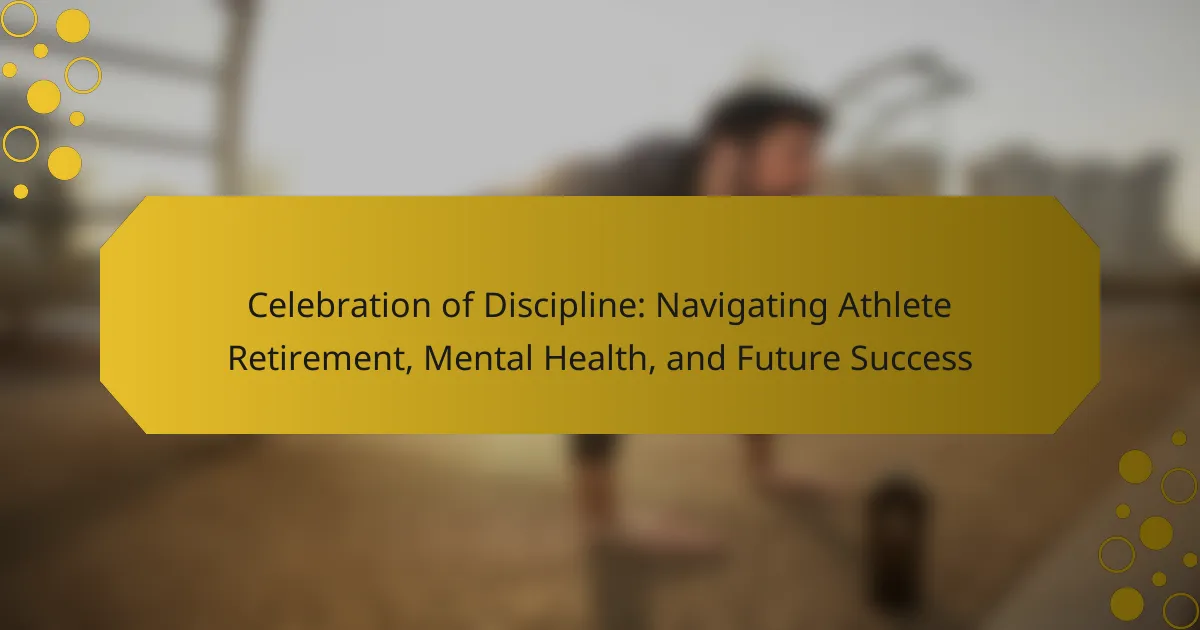Navigating athlete retirement presents significant challenges, including identity loss, mental health issues, and financial uncertainty. Successful transitions require addressing these challenges through mental health strategies, community engagement, and resilience. Athletes can enhance their post-career lives by prioritizing wellness, developing new skills, and fostering strong support networks. Implementing these actionable steps can lead to future success and improved mental well-being.

What are the key challenges athletes face during retirement?
Athletes face significant challenges during retirement, including identity loss, mental health issues, financial uncertainty, and lack of support. Transitioning from a competitive career can lead to feelings of isolation and anxiety.
Identity loss is a root attribute as many athletes define themselves by their sport. Mental health issues, such as depression and anxiety, are unique attributes exacerbated by the abrupt change in lifestyle. Financial uncertainty is a rare attribute, with many athletes unprepared for post-career income.
Support networks often diminish post-retirement, leaving athletes feeling isolated. As a result, addressing these challenges is crucial for successful transitions and future success.
How does identity loss impact mental health after sports?
Identity loss significantly impacts mental health after sports, leading to anxiety, depression, and diminished self-worth. Athletes often define themselves through their sport, and retirement can create a void. This transition may result in feelings of isolation and confusion about personal identity. Research indicates that up to 45% of retired athletes experience mental health issues, underscoring the need for effective support systems. Addressing these challenges through counseling and community engagement can promote healthier transitions and future success.
What role does financial planning play in post-career success?
Financial planning is crucial for post-career success as it provides athletes with a structured approach to managing their finances after retirement. Effective financial strategies help in maintaining their lifestyle, ensuring long-term stability, and reducing stress related to financial insecurity. A study indicates that 60% of retired athletes face financial difficulties within five years of retirement, highlighting the need for proactive planning. By setting clear financial goals and investing wisely, athletes can secure their future and focus on mental health and personal development.
What are the best practices for managing finances post-retirement?
To manage finances post-retirement effectively, prioritize budgeting, investment diversification, and regular financial reviews. Establish a clear budget that accounts for fixed and variable expenses. Diversify investments to balance risk and ensure steady income. Schedule regular reviews to adjust financial strategies based on changing needs and market conditions.
How can athletes maintain their physical health after retiring?
Athletes can maintain their physical health after retiring by establishing a consistent fitness routine, focusing on nutrition, and engaging in mental wellness practices. Regular exercise helps counteract the decline in physical activity post-retirement. Balanced nutrition supports overall health and recovery. Additionally, mental health strategies, such as mindfulness or counseling, aid in adjusting to life after sports. These approaches foster a holistic sense of well-being, addressing both physical and mental health needs.
What fitness routines are beneficial for retired athletes?
Retired athletes can benefit from low-impact fitness routines, strength training, and flexibility exercises. These routines help maintain physical health, enhance mental well-being, and promote future success.
Low-impact activities, such as swimming and cycling, reduce stress on joints while providing cardiovascular benefits. Strength training, focusing on major muscle groups, supports muscle retention and functional strength. Flexibility exercises, including yoga and stretching, improve range of motion and reduce injury risk.
Incorporating social elements, like group classes or team sports, can enhance mental health by fostering connections and community. Tailoring routines to individual needs ensures sustained engagement and long-term benefits.

What unique mental health strategies can support retired athletes?
Retired athletes can benefit from unique mental health strategies that focus on identity reconstruction and community engagement. These strategies include establishing new routines, seeking professional counseling, and participating in peer support groups.
Engaging in creative outlets can also enhance mental well-being. For instance, art therapy or coaching can help retired athletes express emotions and redefine their purpose.
Mindfulness practices are essential as well, promoting emotional regulation and reducing anxiety. Techniques like meditation and yoga can foster resilience during this transitional phase.
Lastly, developing a holistic approach to wellness, including physical fitness and nutrition, supports mental health. These combined strategies can significantly aid retired athletes in navigating their post-sport lives successfully.
How does professional support influence mental well-being?
Professional support significantly enhances mental well-being by providing guidance, resources, and emotional stability. Access to mental health professionals helps athletes navigate the challenges of retirement, fostering resilience and adaptability. Support networks contribute to improved coping strategies, reducing anxiety and depression. Studies indicate that athletes receiving professional guidance report higher satisfaction and a smoother transition into post-sport life. This support is crucial for sustaining mental health and achieving future success.
What types of therapy are most effective for retired athletes?
Cognitive-behavioral therapy, mindfulness-based therapy, and group therapy are most effective for retired athletes. These therapies address mental health challenges, promote coping strategies, and foster community support. Cognitive-behavioral therapy helps in restructuring negative thought patterns. Mindfulness-based therapy enhances emotional regulation and present-moment awareness. Group therapy provides a shared experience, reducing feelings of isolation. Each therapy type offers unique benefits tailored to the needs of retired athletes, ensuring a holistic approach to mental health and future success.
What community resources are available for mental health support?
Community resources for mental health support include hotlines, counseling services, support groups, and online platforms. These resources help individuals navigate mental health challenges, especially during athlete retirement. Local organizations often provide tailored programs, while national helplines offer immediate assistance. Accessing these resources can significantly enhance mental well-being and future success.

What rare attributes contribute to successful athlete transitions?
Successful athlete transitions are influenced by rare attributes such as resilience, adaptability, and emotional intelligence. Resilience helps athletes cope with identity loss post-retirement. Adaptability enables them to navigate new careers or personal lives. Emotional intelligence fosters strong relationships and mental health awareness, critical for future success. These attributes uniquely position athletes to thrive after their sports careers.
How can personal branding enhance post-career opportunities?
Personal branding significantly enhances post-career opportunities by establishing a unique identity that resonates with potential employers. Athletes can leverage their personal stories, skills, and values to connect with diverse audiences. This unique attribute fosters trust and recognition, which are essential for networking and career transitions. A strong personal brand can lead to endorsements, speaking engagements, and coaching opportunities, providing a sustainable career path after retirement. Engaging with mental health advocacy can further amplify an athlete’s brand, showcasing resilience and relatability, thus attracting more opportunities.
What role does mentorship play in athlete transitions?
Mentorship plays a crucial role in athlete transitions by providing guidance and support during retirement. It helps athletes navigate emotional challenges, develop new skills, and plan for future success. Mentors can share their experiences, offering insights on mental health strategies and career opportunities post-sport. This relationship fosters resilience and adaptability, essential for athletes facing significant life changes.
How can retired athletes become effective mentors?
Retired athletes can become effective mentors by leveraging their unique experiences and insights. They should focus on building relationships, sharing knowledge, and providing emotional support to younger athletes.
Active listening is crucial; it fosters trust and understanding. Additionally, establishing structured mentorship programs can enhance the mentoring process. These programs can include goal-setting sessions, skill development workshops, and mental health discussions, addressing the unique challenges athletes face post-retirement.
Furthermore, retired athletes should emphasize the importance of mental health, as transitioning from a competitive career can be challenging. By sharing their own struggles and coping strategies, they can offer valuable perspectives.
Ultimately, effective mentoring requires commitment, empathy, and a genuine desire to guide the next generation towards success.

What actionable steps can athletes take for a successful post-career life?
Athletes can take several actionable steps for a successful post-career life. First, they should prioritize mental health by seeking professional support and building a strong support network. Next, developing new skills through education or vocational training can provide alternative career paths. Additionally, engaging in community service or mentorship can foster a sense of purpose. Lastly, maintaining physical fitness through regular exercise can enhance overall well-being.
What are the best practices for setting new life goals after sports?
Setting new life goals after sports requires a structured approach. Focus on self-reflection, exploring new interests, and building a support network.
1. Self-Reflection: Assess your skills and values to identify passions beyond sports.
2. Explore Interests: Engage in activities or education that stimulate your curiosity and creativity.
3. Set SMART Goals: Establish Specific, Measurable, Achievable, Relevant, and Time-bound goals to provide clarity and direction.
4. Build a Support Network: Surround yourself with mentors and peers who encourage your new pursuits.
5. Prioritize Mental Health: Consider professional support if needed to navigate emotional transitions.
These practices foster personal growth and facilitate a successful transition into post-sport life.
How can athletes cultivate a fulfilling life outside of competition?
Athletes can cultivate a fulfilling life outside of competition by exploring new passions, building relationships, and prioritizing mental health. Engaging in hobbies fosters creativity and personal growth. Establishing connections with non-athletes broadens perspectives and support networks. Prioritizing mental health through therapy or mindfulness practices enhances overall well-being. Transitioning from competition can be challenging; developing a clear plan for post-athletic life is essential for future success.
What hobbies or interests can provide purpose post-retirement?
Engaging in hobbies or interests post-retirement can significantly enhance purpose and well-being. Activities such as volunteering, mentoring, or pursuing creative arts can foster a sense of contribution and fulfillment. Physical activities like hiking or yoga promote mental health and physical fitness, essential for maintaining vitality. Additionally, joining clubs or groups centered around shared interests can strengthen social connections, combating isolation. Exploring new skills or lifelong learning opportunities keeps the mind active, ensuring continued growth and satisfaction.
What common mistakes should athletes avoid in their transition?
Athletes should avoid common mistakes like neglecting mental health, failing to plan for retirement, and isolating themselves from support networks. Transitioning from sports can be challenging; proactive steps are essential. Prioritize mental wellness, seek professional guidance, and maintain connections with teammates and mentors. These strategies enhance future success and overall well-being.
